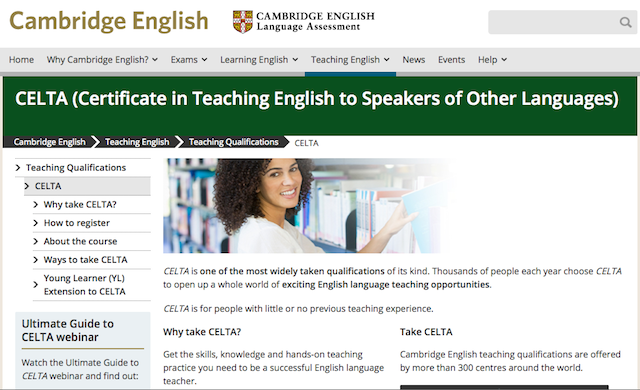 You’re stuck, in need of change, and looking for any way out. You don’t want to go back to school or put in another monotonous year at work. You want to travel and experience life in a new land. But rent and living has left you so broke you can’t even splurge on a can of coke. Believe you me…I know the feeling.
You’re stuck, in need of change, and looking for any way out. You don’t want to go back to school or put in another monotonous year at work. You want to travel and experience life in a new land. But rent and living has left you so broke you can’t even splurge on a can of coke. Believe you me…I know the feeling.
Fortunately, there are loads of opportunities that will enable you to run away and live abroad. You could work in a hostel just about anywhere. You could live the high life on the high seas as a deckhand on a luxury yacht. You could even become your own boss and make money with a travel blog. But by far the most stabile, rewarding and easiest job to secure is teaching English.
Teaching English abroad is ideal for backpackers looking to take a break from the road and save a bit of money. It’s also perfect for first timers who want to ease into a new culture while living comfortably.
Although finding a teaching job in a foreign country can be a daunting process, it’s much easier than you might think. And while the high paying teaching positions require proper pedagogical degrees, there are plenty of well paying gigs available with a decent level of English and a quick certification.
In the following runaway guide you’ll find everything you need to know about teaching English abroad.
Finding A Teaching Job Without Qualifications
As long as you can speak English, it’s possible to find a school or individual that will hire you to teach it. Check out Craigslist and local equivalents for opportunities. However, without teaching experience, a B.A. or a TEFL/TESOL certificate, you’ll be limited to low or no paying jobs.
Finding A Teaching Job With Only A Bachelors
If you have bachelors in anything, you’re already in a great position to get hired. I myself landed a job teaching English to little kids at private school in Japan for 40$/hour with nothing but my B.A.
If you majored in Business you’re chances of landing a high paying job is even greater. Teachers of business English are in high demand around the world and can earn significantly more.
Finding A Teaching Job With A TEFL Certification
Whether you have a B.A. or not, it’s not a bad idea to invest in a TEFL certification. TEFL stands for teaching English as a foreign language. It is also known as TESOL in the US and Canada. Many schools require this training as a minimum and some require it in addition to a B.A.
You can either get certified through a proper classroom based course (advisable for those without a B.A.) or or an online course. The former option is more expensive but often viewed as more legitimate. The latter is considerably cheaper and still accepted by many. In the end, whichever you decide, it really depends on the school’s requirements. So if you’ve already found the school you want to teach at, ask what qualifications they’re looking for.
How To Choose A TEFL Course
With hundreds of TEFL certification programs throughout the world and online, it’s hard knowing which one to chose. And since there’s no single overarching body of accreditation, it’s also hard to tell which one is the best and most accepted.
You should consider two criteria when searching for a course. First, you want to make sure that the company has a good reputation and that their certifications are widely accepted. Second, and most importantly, you should find how much support the company provides towards helping you find a job.
If money isn’t an issue and you’re serious about developing a proper career as an English teacher abroad, you should consider a classroom course at a reputable university. Unfortunately, these courses often cost between 1,500 and 3,000$. One of the most internationally recognized certificates is the Cambridge CELTA (2,695$).
But be sure to look around for yourself and weigh the different options against your budget. And when you find an intriguing looking program, ask lots of questions before you invest. You want to make sure that you will the learn the skills, gain the qualifications, and be given employment support so that you can make your English teaching goals a reality.

Most internationally recognized course, the Cambridge CELTA certification
The Best Country To Teach English In
The best countries to teach English in are those with rapidly growing economies, a poor level of English as a second language, and a lack of English teachers. China, Korea, and Taiwan are excellent choices. There’s a strong demand for teachers and many schools offer high salaries and comfortable accommodations. However, you shouldn’t choose a country based on salary alone. Since you often have to commit to a 6-month or even yearlong contract, you need to choose a country that is most appealing to you, a country that you can see becoming your home away from home.
Teaching English In Japan
If you love anime, Sumo wrestling, and Sushi, Japan is where it’s at. Although the economic growth rate has declined significantly since the 1980’s, there are still plenty of jobs to be found. However, while Japan is known for offering some of the highest salaries in Asia, the amount of bureaucracy surrounding work visas makes it difficult to find a school willing to hire you. Check out GaijinPot for job listing. If you have a Bachelors, you’re eligible for the JET program. It’s run by the Japanese government and pays extremely well, 40,000/year.
Teaching English In Korea
Thanks to Hyundai, Samsung, Kimchi, and a strong capitalist culture, Korea has become one of the best countries to teach English in. Schools pay enough that you can actually save money. They also often include accommodation in the contract. Check out the Korean government sponsored program called EPIK for job opportunities. For a glimpse into the life of an American teaching English in Korea, check out Runaway Rendezvous With Morgan: An English Teacher In Korea.
Teaching English In Saudi Arabia
Saudi Arabia pays English teachers more money than most community college professors. They also include housing, roundtrip airfare and a living stipend, which means you can pretty much save everything. It all sounds great except for the fact that you’ll be living and working in the middle of the desert and under a government that punishes alcohol consumption by the whip.
Conclusion
If you don’t have prior experience or a bachelors degree, the easiest way to break into a teaching job is by signing up for any all inclusive program like TEFL247’s Burst program. It gives you real experience, the TELF certificate and post program job opportunities. However, if you have a bachelors, you’re already eligible to be hired by many government run programs such as Korea’s EPIK program (albeit with less pay than if you had a TEFL certificate in combination). Finally, if you just want a temporary gig tutoring English in an informal setting, you can usually find one by checking local classifieds like Japan’s GaijinPot.
Good luck and happy job hunting!
-Leif












Hi Leif, and thanks a lot for all of this information! I just stumbled upon your blog and it’s been a great read.
I remember researching a bit about teaching English abroad a while ago but gave up when I read somewhere (can’t remember which website) that in most cases you had to originate from an English-speaking country in order to get a job or even a work visa. I’m from Sweden and had set my mind on working in South Korea but was greatly disappointed when I found out about this.
What are your thoughts? Do you think it’s possible to get around in any way?
Hey Madeleine, my pleasure. Really glad you like the guide! There are some schools that might have a problem that you’re not a native speaker but for the most part, as long as you have a tefl certificate you should be ok. Koreans and Japanese know that scandinavians speak Enlgish very well. But I would definitely recommend just sending an email to the organization/school your interested in working for. Lykke til! -Leif
Thank you for all the useful information. I have a 120 hour TEFL certification but have recently been advised that a CELTA is a better qualification? Has anyone here worked in Moscow or Thailand with the 120 hour combined TEFL Course?
Hey Elena, I think it really depends on the individual school. You should research school first and ask them what they’re looking for. Good luck!